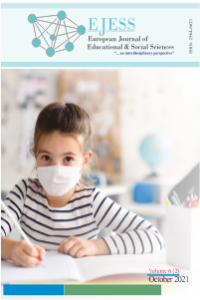Research Article
The Ethical Role of Interest-Free Economy in the Christian and Islamic Systems. A Legal Historical and Ethical – Economic Approach
Abstract
Mainstream economists, and most non-economists, as well, consider the existence of interest as a matter-of-course. Moreover, some economists say that it is an essential regulator of the economy, which creates a balance between savers and investors, regulates the borrowings, and it is an essential tool for the central bank's monetary control. In our study we examine the role of the interest in the Christian and Islamic moral and economy. Within the framework of the moral side we are curious about the methods by the Islamic economy works without interest, if interest itself is so important that it substantiates the whole economic mechanism.
Keywords
References
- Arisztotelész (Aristotle (1923) Politika. Budapest: Akadémiai Kiadó.
- Aquinas, T. (2011) Summa Theologica. Budapest: Szent István Társulat.
- Balázs, L.- Bezrati, R.-Falus, O. (2019) Operating Principles of Islamic Banking In: István András, Mónika Rajcsányi Molnár (eds): East-West Cohesion III. Strategical study volumes. Subotica: Csíkos Group, 32-49.
- Abdul Aziz Bin Sattam, A. A. (2015) Shari’a and the Concept of Benefit: The Use and Function of Maslaha in Islamic Jurisprudence London: I.B. Tauris&Co Ltd.
- Brósz, R. – Pólay, E. (1974) Római Jog. Budapest: Tankönyvkiadó Vállalat.
- Csabai, Z. (2006) Babilónia gazdaságtörténete a kölcsönszerződések tükrében (Kr. e. 1. évezred), Ókor, 2006/3-4, 85-86.
- Drábik, J. (2003) Uzsoracivilizáció. A kamatkapitalizmus új világrendje. Debrecen: Gold Book.
- Drábik János., Válogatott írások, A kamatkapitalizmus és a szervezett pénzhatalom, http://mek.niif.hu/06800/06897/html/0001.htm Downloaded: 2019.09.14.
- Emon, A. M. (2010) Islamic Natural Law Theories. New York: Oxford University Press.
- Falus, O. (2017) Waqf as a Traditional Legal Institution for Social Responsibility according to Natural Law. POLIGRAFI, Islam and Democracy. number 85/86. volume 22, 2017, 87-104.
- Ganzfried, S. – Aruch, K. S. (2019) A pénzkölcsön elengedésének szabályai (180. fejezet), http://zsido.com/fejezetek/a-penzkolcson-a-elengedesenek-szabalyai/ Downloaded: 2019.08.25.
- Geitmann, R. (1989) Bibel, Kirchen und Zinswirtschaft. Zeitschrift für Sozialökonomie. Heft 80, S. 17-24.
- Geitmann, R. (2000) A Biblia, az egyházak és a kamatgazdaság. Budakalász
- Hamidullah, M. (1992) Introduciton to Islam. New Delhi: Kilab Bhavan Publisher.
- Hammurabi’ s Code: http://mek.niif.hu/07200/07287/07287.pdf. Downloaded: 2018. 07.15.
- Jolowicz, H.F. (1952) Historical Introduction to the Study of Roman Law. New York: Cambridge University Press.
- Pálfi, G. (2010) Iszlám finanszírozás a pénzügyi piacokon. Fordulat, 11. szám 2010 tél.
- Pecz, V. (ed.) (1904) Ókori Lexikon ,vol. I. , fenus, Budapest: Franklin Irodalmi és Nyomdai Rt.
- Sayre-McCord, G. (1988) Essays on Moral Realism. Ithaca: Cornell University Press.
- Varga, J. - Cseh, B. (2018) The operation of islamic banks on the basis of an EU example. KÖZTES EURÓPA: TÁRSADALOMTUDOMÁNYI FOLYÓIRAT: A VIKEK KÖZLEMÉNYEI. Vol. 10:1 (No. 23), 125-134.
- Zarrokh, E. (2010) Iranian Islamic banking. European Journal of Law and Economics. Vol. 29, 177–193.
Year 2021,
Volume: 6 Issue: 2, 146 - 155, 31.10.2021
Abstract
References
- Arisztotelész (Aristotle (1923) Politika. Budapest: Akadémiai Kiadó.
- Aquinas, T. (2011) Summa Theologica. Budapest: Szent István Társulat.
- Balázs, L.- Bezrati, R.-Falus, O. (2019) Operating Principles of Islamic Banking In: István András, Mónika Rajcsányi Molnár (eds): East-West Cohesion III. Strategical study volumes. Subotica: Csíkos Group, 32-49.
- Abdul Aziz Bin Sattam, A. A. (2015) Shari’a and the Concept of Benefit: The Use and Function of Maslaha in Islamic Jurisprudence London: I.B. Tauris&Co Ltd.
- Brósz, R. – Pólay, E. (1974) Római Jog. Budapest: Tankönyvkiadó Vállalat.
- Csabai, Z. (2006) Babilónia gazdaságtörténete a kölcsönszerződések tükrében (Kr. e. 1. évezred), Ókor, 2006/3-4, 85-86.
- Drábik, J. (2003) Uzsoracivilizáció. A kamatkapitalizmus új világrendje. Debrecen: Gold Book.
- Drábik János., Válogatott írások, A kamatkapitalizmus és a szervezett pénzhatalom, http://mek.niif.hu/06800/06897/html/0001.htm Downloaded: 2019.09.14.
- Emon, A. M. (2010) Islamic Natural Law Theories. New York: Oxford University Press.
- Falus, O. (2017) Waqf as a Traditional Legal Institution for Social Responsibility according to Natural Law. POLIGRAFI, Islam and Democracy. number 85/86. volume 22, 2017, 87-104.
- Ganzfried, S. – Aruch, K. S. (2019) A pénzkölcsön elengedésének szabályai (180. fejezet), http://zsido.com/fejezetek/a-penzkolcson-a-elengedesenek-szabalyai/ Downloaded: 2019.08.25.
- Geitmann, R. (1989) Bibel, Kirchen und Zinswirtschaft. Zeitschrift für Sozialökonomie. Heft 80, S. 17-24.
- Geitmann, R. (2000) A Biblia, az egyházak és a kamatgazdaság. Budakalász
- Hamidullah, M. (1992) Introduciton to Islam. New Delhi: Kilab Bhavan Publisher.
- Hammurabi’ s Code: http://mek.niif.hu/07200/07287/07287.pdf. Downloaded: 2018. 07.15.
- Jolowicz, H.F. (1952) Historical Introduction to the Study of Roman Law. New York: Cambridge University Press.
- Pálfi, G. (2010) Iszlám finanszírozás a pénzügyi piacokon. Fordulat, 11. szám 2010 tél.
- Pecz, V. (ed.) (1904) Ókori Lexikon ,vol. I. , fenus, Budapest: Franklin Irodalmi és Nyomdai Rt.
- Sayre-McCord, G. (1988) Essays on Moral Realism. Ithaca: Cornell University Press.
- Varga, J. - Cseh, B. (2018) The operation of islamic banks on the basis of an EU example. KÖZTES EURÓPA: TÁRSADALOMTUDOMÁNYI FOLYÓIRAT: A VIKEK KÖZLEMÉNYEI. Vol. 10:1 (No. 23), 125-134.
- Zarrokh, E. (2010) Iranian Islamic banking. European Journal of Law and Economics. Vol. 29, 177–193.
There are 21 citations in total.
Details
| Primary Language | English |
|---|---|
| Journal Section | Articles |
| Authors | |
| Publication Date | October 31, 2021 |
| Published in Issue | Year 2021 Volume: 6 Issue: 2 |


